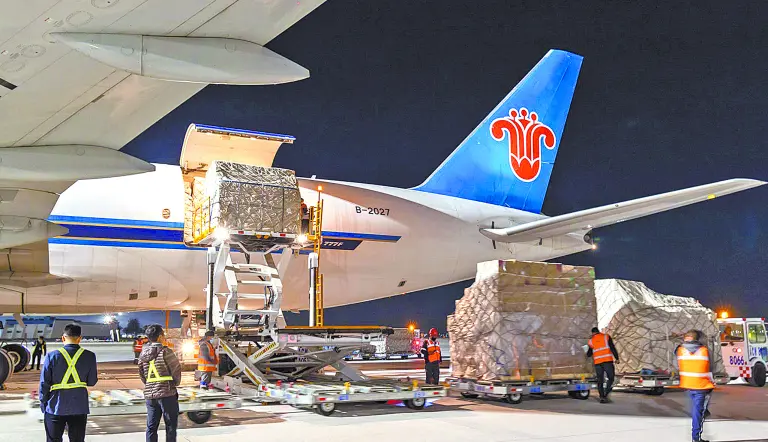Mexico City — The United States government has revoked authorization for 13 routes operated by Mexican airlines from the Felipe Ángeles International Airport (AIFA) and the Mexico City International Airport (AICM). The measure, announced by the US Department of Transportation (DOT), will take effect on November 7 and is a retaliatory action by Washington over its dissatisfaction with the prohibition of dedicated cargo operations at the AICM and their transfer to the AIFA, due to the alleged anti-competitive effects this generated.
The DOT's order, signed by the Deputy Assistant Secretary for Aviation and International Affairs, Daniel J. Edwards, prohibits Aeroméxico from continuing to operate its existing routes from the AIFA to Houston and McAllen. It also withdraws approval for 11 new routes that Aeroméxico, Volaris, and Viva Aerobus were scheduled to begin within the next two months. Two of these routes were to depart from the AICM: an Aeroméxico route to Puerto Rico starting this Wednesday and a Volaris route to Newark starting next Monday. The remaining nine routes were to be operated by Viva Aerobus from the AIFA.
Additionally, the DOT provisionally prohibited the transport of cargo on passenger flights from the AICM, a service primarily operated by Aeroméxico. This measure is set to take effect after 108 days. The DOT has offered a 14-day period for the affected airlines to submit their comments, with responses due seven days later.
According to the two orders published by the DOT, the primary US concern relates to the Presidential Decree that removed cargo operations from the AICM and the non-transparent management of takeoff and landing slots at the same terminal, which, from the US perspective, has created disadvantages for American airlines.
The DOT stated that its primary objective is not to perpetuate or worsen the situation, but to establish an environment where airlines from both sides can exercise their bilateral rights, as they have requested. Consequently, it made clear that it is willing to reconsider its decision to not authorize the operations if the Government of Mexico complies with the existing bilateral air agreement.
As of the close of this edition, Mexico's Secretariat of Infrastructure, Communications, and Transportation (SICT) had not issued any comment on the DOT's decisions, which were made just before the year-end holiday season, a period of high air traffic activity between Mexico and the US.
In a statement, Volaris said it was analyzing the scope of the measures, noting that the impact on its cargo operations would be marginal due to its minimal participation in that sector. Regarding its Newark route, the airline stated it is "seeing the options that exist to minimize the affectations to its users."
"Volaris is in contact with the SICT, as well as with the industry, in order to dialogue and find a solution to this situation, that avoids future affectations on its operations and the Mexican airline sector," the company said.
Impact on the AIFA
In terms of connectivity, the most significant immediate impact will be felt at the AIFA, which is administered by the Secretariat of National Defense (Sedena) and is in the process of increasing operations. The airport had previously announced with fanfare a package of nine new routes by Viva Aerobus, including flights to Chicago, Austin, Denver, Dallas, Miami, and Los Angeles. Furthermore, the state-owned airline Mexicana de Aviación was planning to connect to the United States from this terminal with its new Embraer aircraft to increase activity and generate greater revenue.
In this regard, the DOT noted that "the sudden reductions in capacity" at the AICM—referring to the reduction of slots and the removal of cargo operations due to saturation concerns—occurred at a time when the Mexican government was actively seeking to increase traffic at the AIFA.
The US authority acknowledged that during the present year, Mexican officials have been in contact with them, presenting the arguments for their decisions, but this has not been sufficient to avoid further restrictive actions. It also expressed concern that the Decree removing cargo airlines from the AICM has not been repealed and that the slots taken from US airlines at that terminal have not been competitively restored, although it recognized that some were returned for use starting in the summer 2026 season.
The DOT and its "America First" Strategy
The recent route revocations are part of a series of actions taken by the US DOT concerning the Mexican aviation market:
- On July 19, it requested that Aeroméxico, Volaris, Viva, Estafeta, Aerus, TAR, and MAS Cargo submit their current itineraries for combined and exclusive cargo services to review legal compliance.
- On July 19, it issued an order requiring that charter flight operations from Mexico (both passenger and cargo) must be pre-approved, with corresponding information submitted in advance.
- On September 15, it issued an order to revoke the antitrust immunity held by Delta Air Lines and Aeroméxico, a measure set to take effect on the first day of January 2026, which has already been challenged by the parties.
- On October 28, it announced it would prohibit Mexican passenger airlines from transporting cargo between the US and the AICM, withdrew its approval for the operation of two active routes between the US and the AIFA, and withdrew its approval for nine new routes between the AIFA and the US, one between the AICM and Newark, and one between the AICM and San Juan, Puerto Rico.
Discover more from Riviera Maya News & Events
Subscribe to get the latest posts sent to your email.
